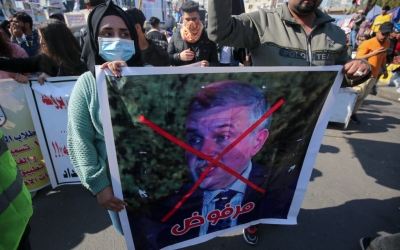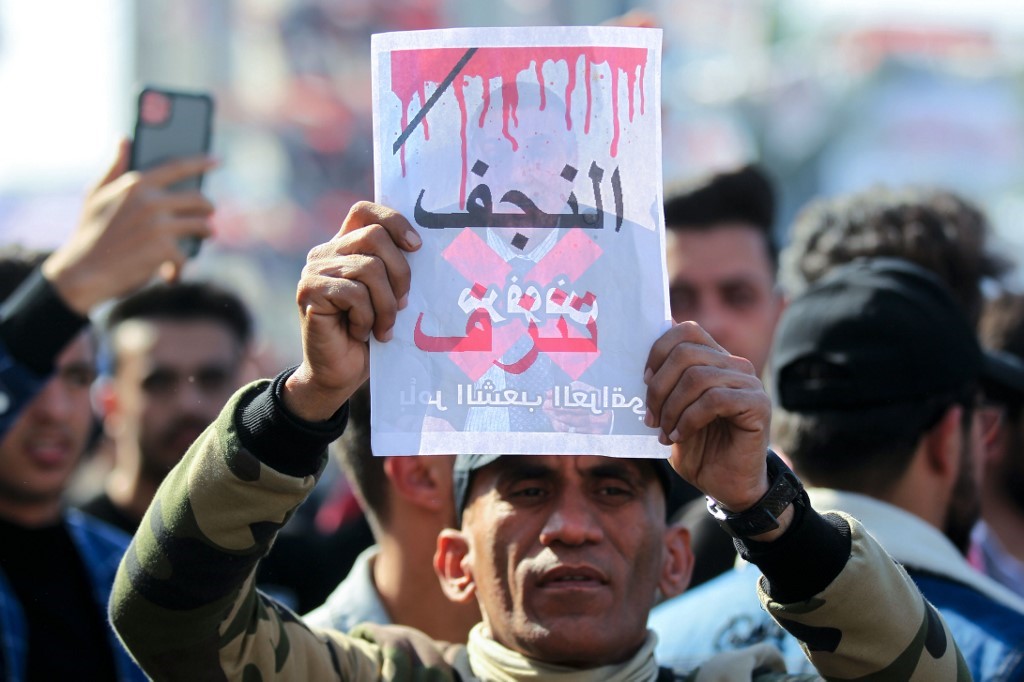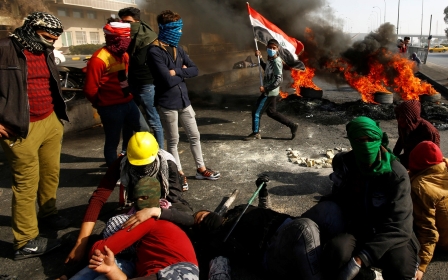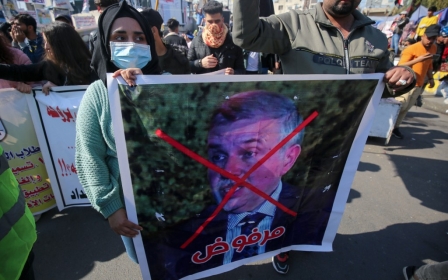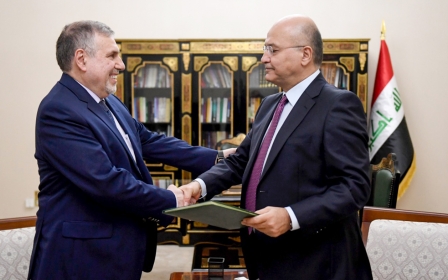Muqtada al-Sadr's supporters accused of 'massacres' in Iraq's south
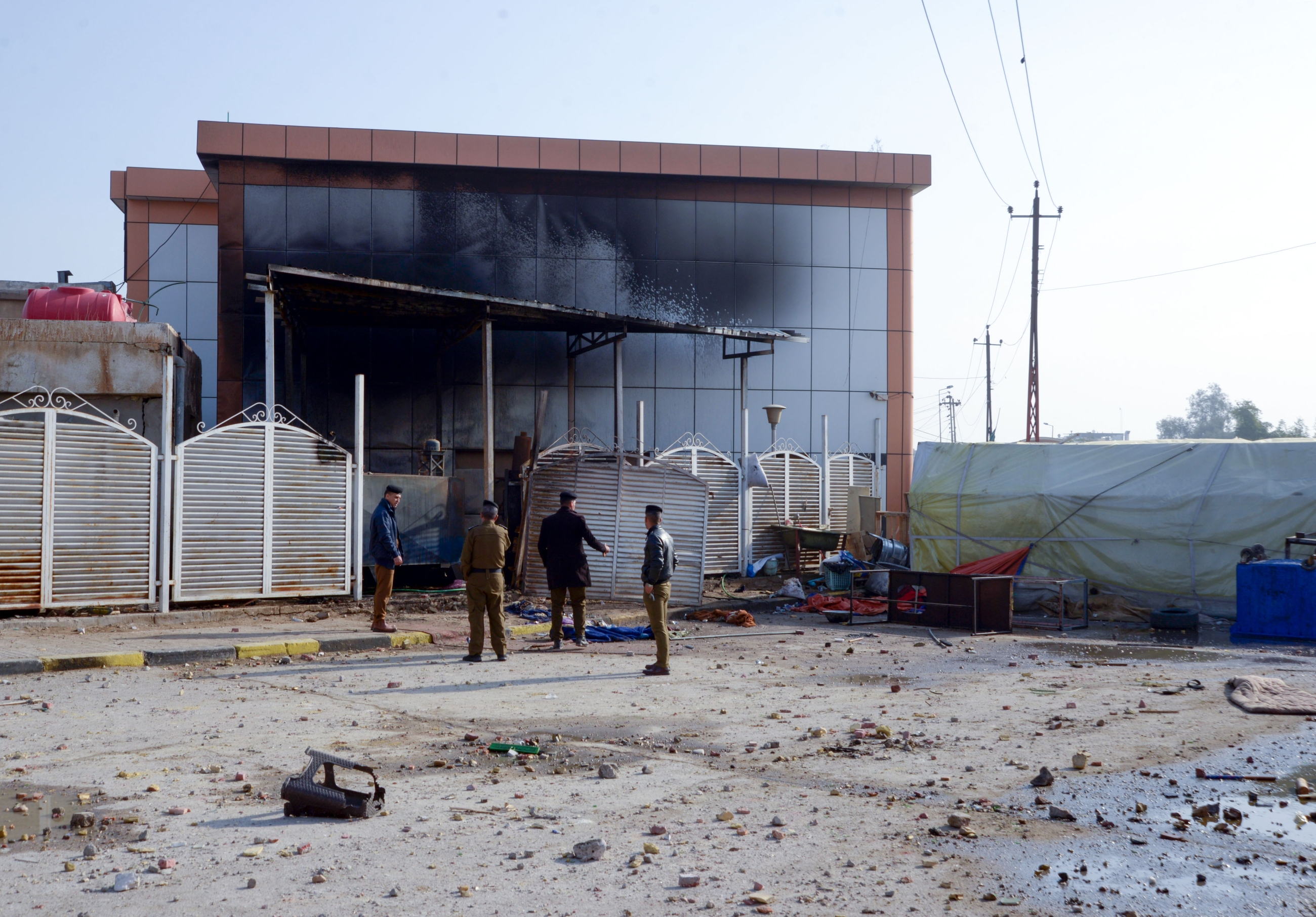
Supporters of Shia cleric Muqtada al-Sadr have been accused of carrying out "massacres" following the killing of anti-government demonstrators and the torching of protest camps in cities across southern Iraq.
Sadr supporters - nicknamed "Blue Caps" after their signature item of clothing - opened fire on a protest area in the holy city of Karbala on Thursday.
Medical sources in the Karbala health directorate said that the incident left more than 10 dead.
The incident follows a similar attack in the city of Najaf on Wednesday evening.
Director of Najaf's health department Ali al-Awadi said at least seven people were killed and 25 were wounded in the southern Iraqi city on Wednesday, after Sadr's supporters opened fire on protesters while trying to clear their encampment.
Eyewitnesses told Middle East Eye that vehicles driven by Sadr supporters in Najaf were chasing the protesters in the city’s streets in at attempt to arrest them, as well as trying to arrest wounded protesters in the city’s hospitals.
The violent scenes, spread on social media, saw people rushing into hospitals to donate blood when the city’s hospitals declared an urgent need for donors.
Medical sources told MEE the forensics departments in Najaf’s hospitals were filled with the dead bodies of protesters who were killed by Sadrists when they use the live ammunition used against the protesters.
Activists and medics suggested the number of those killed was higher than the official estimates being reported in the media.
Omar Al-Farhan, director of the Iraqi War Crime Documentation Center, told MEE “the number of those killed in Najaf were 23 protesters and more than 197 wounded, 16 of them in urgent case."
Following the violence in Karbala and Najaf, people in the provinces of Nasiriyah, Muthanna and Wasit poured into streets in solidarity.
Hours after the Najaf incident, protesters in Baghdad’s Tahrir Square chanted “Najaf we will never forget you, Baghdad with you”.
Sadr had declared himself a supporter of Iraq's anti-government protests, which began on 1 October, but following an agreement with Iran-backed groups over the appointment of new Prime Minister-designate Mohammed Tawfik Allawi, he has thrown his weight behind the government.
His hardcore followers, partly provoked by anti-Sadr slogans from demonstrators and conflicting messages from the cleric, have repeatedly attacked protest camps across Iraq over the last few weeks.
Alaa Mohammed Hussein, 25, who is from Najaf, said that Sadr's supporters, along with security forces and other armed groups, were trying to "curb the protests" using violence.
“The Sadrists and SWAT forces accompanying other unknown militia members opened fire at the protesters in front of the Iraqi security forces and they did nothing to prevent them killing the peaceful demonstrators," he said.
Despite the setbacks, he said that the time would come soon when armed groups like the Sadrists would no longer be able to act with impunity.
“Saddam ruled Iraq for decades and he's gone - the militias' fate will be like Saddam’s one.”
'Najaf is burning! Najaf is bleeding!'
In the last week the Blue Caps have torched protest tents in Baghdad's Tahrir Square and Basra in attempts to suppress the demonstrations.
A video widely circulated on social media appeared to show one of the Blue Caps insulting a female student during the marches rejecting Allawi.
Protesters view Allawi, who follows the ousted Adel Abdul Mahdi, as another interchangeable representative of Iraq's political establishment.
“The blue caps used the weapons, knives and sticks to insult the Basra protesters when they rejected Mohammed Tawfik Allawi to replace Adel Abdul Mahdi, the former resigned PM,” said Ahmed Abdallah, a 29-year-old protester from Basra.
Abdallah added: “The blue caps people walking towards our tents and gave us flowers, they are liars, they wanted to shoot photos and videos to tell people that they are peaceful, but the fact is different, they used all kind of weapons to kill people in Iraq’s protests square, under Sadr orders.”
Following the violence in the south, Iraqis on social media platforms created a hashtag "Najaf is burning! Najaf is bleeding!" demanding the international community intervene to offer protection.
On Thursday, a number of social media users said they would be reporting Sadr's social media accounts for incitement.
Special representative of the Secretary-General for the United Nations Assistance Mission for Iraq, Jeanine Hennis-Plasschaert, issued a statement strongly condemning the violence.
“Protection of peaceful protesters should be guaranteed at all times, not when it is too late,” she said.
The US embassy in Baghdad also released a statement in which it said it applauded the "peaceful protestors for their admirable restraint in the face of these murderous tactics" and said the government had an "obligation to put an end to this thuggery".
'Iran's orders'
Both the US and Iraqi activists have frequently blamed Iran and its proxies in the country for the crackdown on demonstrators, which has seen at least 500 people killed, and numerous kidnappings.
Though Sadr, who is currently based in the Iranian city of Qom, had previously positioned himself as opposed to the Islamic Republic's influence in Iraq, many have accused him of pivoting to Iran since the assassination of Iranian military commander Qassem Suleimani and Iraqi militia leader Abu Mahdi al-Mohandes by the US in early January.
'I think the tribes will intervene in order to save their youths from the militias'
- Ghanim Al-Abed, analyst
The Iraqi political analyst Ghanim Al-Abed told MEE that the crackdown on protesters by Sadr's supporters were "on Iran's orders" and that the government was turning a blind eye.
“All the massacres which have happened within the last few days - the government took no tangible action," he said.
"Either it fears the militias or it gave the green light to killed the protesters according to Iran’s orders."
He added that if the violence against activists continued, there could be an escalation of the conflict as the powerful - and often well-armed - tribes got involved in the fighting.
"I think the tribes will intervene in order to save their youths from the militias," he said.
Middle East Eye propose une couverture et une analyse indépendantes et incomparables du Moyen-Orient, de l’Afrique du Nord et d’autres régions du monde. Pour en savoir plus sur la reprise de ce contenu et les frais qui s’appliquent, veuillez remplir ce formulaire [en anglais]. Pour en savoir plus sur MEE, cliquez ici [en anglais].


